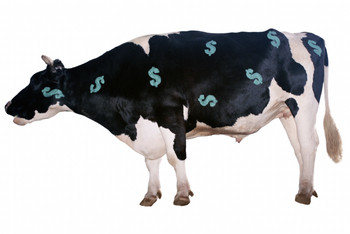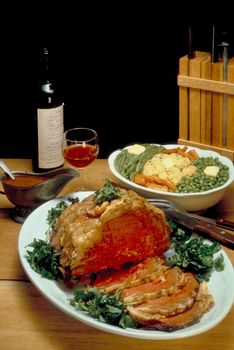How does a Beef Ranch Stay in Business?
 Simple answer: income greater than expenses and needed reserves. Makes running a beef ranch seem simple.
Simple answer: income greater than expenses and needed reserves. Makes running a beef ranch seem simple.This was the problem I encountered when I took over farming. Most (and we still do, at this point) maintain a second job away from the farm. Because (as "everybody conventionally knows") you keep farming until the money runs out. It's that second job which pays the costs of farming when the crop doesn't.
It's the commoditized base of farming which is keeping dirt-poor farmers dirt-poor.
We studied this over and over and kept coming up to the same conclusion. Getting big doesn't make your farm more profitable. Studies show that about 300 acres is the max on cost breaks with the income/expenses leverage. More acres above that and you are doing longer hours with the same basic cost per acre. It's how many acres can you farm to replace your day job income. Not less hours or easier work.
Now you have to get smart about what you are doing. We really have nothing bad to say about corn-fed/lot-finished beef (other than it has no taste, really - IMHO). But if you are selling a lot of bland burgers at a discount price, this is exactly what you want. And that is the commodity beef business. Why packers are vertically integrating to cut out middleman costs.
Our difference with them is that when we started crunching numbers, we found that our best profit point was to get away from corn-fed beef entirely. Half our annual crop was going to pay for feed costs. The next year we made more money simply selling them as feeders (just weaned) and stayed in the warm house more often than filling grain feeders in the middle of winter and fixing broken/frozen water lines.
The next breakthrough was learning we could almost double that by simply selling them as yearlings (one year old) to other people who had feed lots with cheaper corn and hated staying inside all winter. Kept my weaned calves on hay with the other cows and calves and we still stayed in the warm house more.
The next point was finding that if we manage our grazing and have leftover tall grass in the pastures, we can make less hay and so take my expenses even further down. That's because we're moving to grass-fed beef with managed grazing (ultimately right on up to ultra-high-density stocking aka "mob" grazing) .
Funny thing is: the more naturally we raise our beef, the cheaper it gets to raise it. So farm profits rise. It's not "buy more land and work longer and harder", it's "manage what we have smarter and work less".
O
 f
course, the next up from that is where you come in. Where we sell
directly to the client, and keep them happy with what they get, we can
make more than we would when we send them to the auction. Not a lot
more, but it will make our farm more and save you a lot more by getting
you to buy higher quality beef that you can inspect yourself for much
less than you would pay else where for similar or lesser quality.
f
course, the next up from that is where you come in. Where we sell
directly to the client, and keep them happy with what they get, we can
make more than we would when we send them to the auction. Not a lot
more, but it will make our farm more and save you a lot more by getting
you to buy higher quality beef that you can inspect yourself for much
less than you would pay else where for similar or lesser quality.If you buy the whole cow direct from us, we can get you 600 pounds of beef for about $2.00 a pound (right this second, anyway - prices change all the time). And that's the average price of the Gawd-knows-where-it-came-from-or-how-it-got-here variety hamburger in the supermarkets. And you get steaks and roasts and filets-mignon's all for the price of that questionable hamburger.
But all that beef won't fit in the average home freezer. And it's a huge chunk of cash to spend at once. So we use a local marketer to find clients and we sell the beef to four people at once. They each drive off with about 150 pounds. But it costs them a little more per pound so that the marketer makes enough to keep selling this stuff, and our farm still gets a little above sending it all to auction. And the customer knows exactly where that beef came from - food security.
The answer is still the same. We keep figuring out how to help Nature do what She does best, and She rewards me in the marketplace with more of this funny green stuff that cattle won't eat and bankers will.
That's how our farm stays in business.








No comments:
Post a Comment